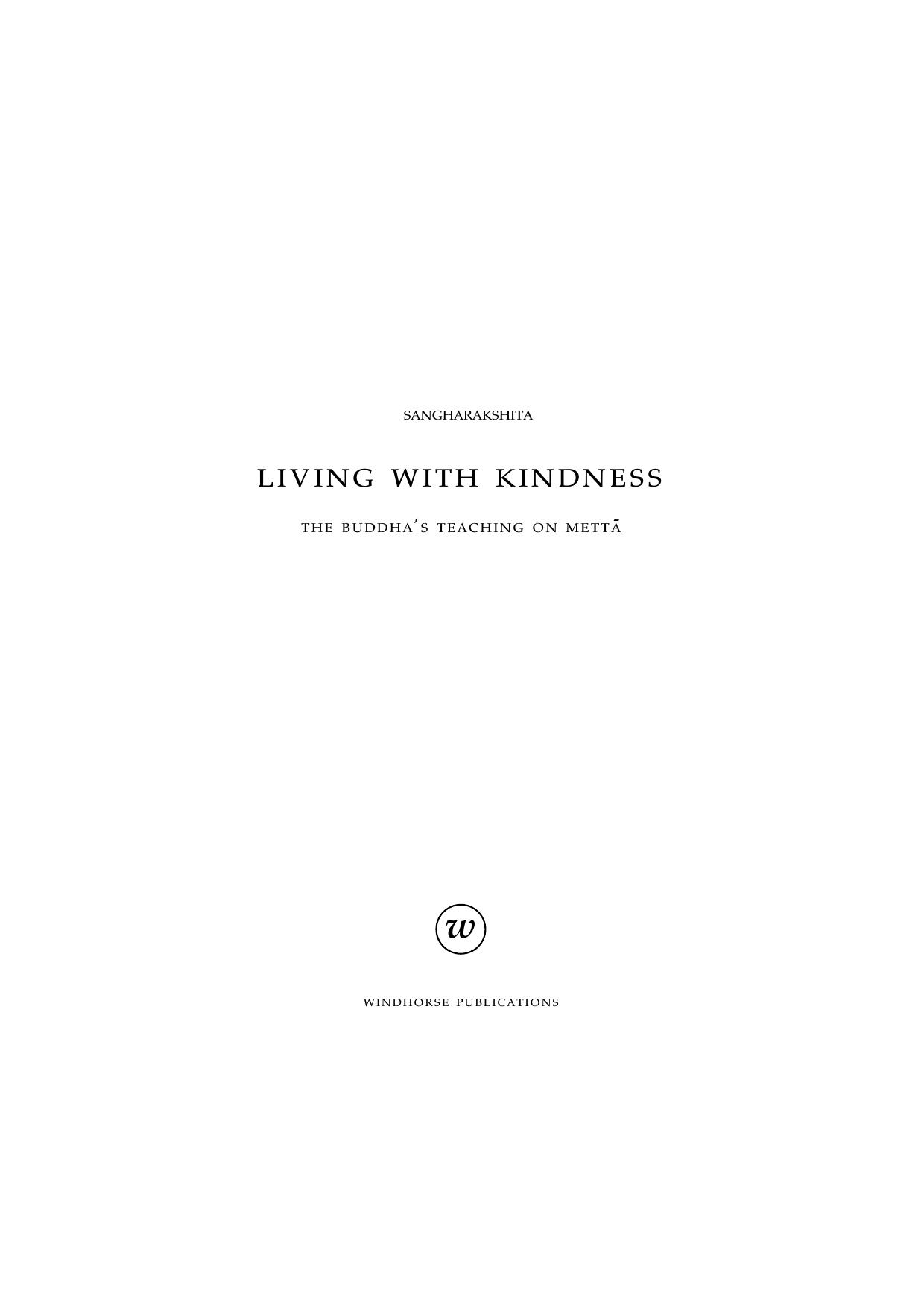Living with Kindness by Sangharakshita

Author:Sangharakshita [Sangharakshita]
Language: eng
Format: epub, pdf
Publisher: Windhorse Publications Ltd
Published: 2012-09-15T16:00:00+00:00
Chapter Three
Cultivating Mettā
May all beings be happy and secure, may their
hearts be wholesome!
Sukhino vā khemino hontu
sabbe sattā bhavantu sukhitattā
We have now come to a natural break in the sutta. Up to this point, the teaching has been about setting up preparatory conditions for the effective cultivation of mettā. One might even say that if you fulfil these conditions – if you are capable, straight, upright, and so on – you will be in such a skilful, healthy frame of mind that you can’t help wishing others well. It will be the natural thing for you to do, not only when you sit down to meditate but all the time. Your mental and emotional state will be so positive that, quite spontaneously, you will wish for others to enjoy health, happiness, security, and peace of mind.
The next section of the sutta begins with a phrase that sums up the generosity, the sincere and heartfelt regard for others, in which the cultivation of mettā consists. We wish simply that beings may be happy and secure and that their hearts may be wholesome. Khemino means secure, that is, free from danger, free from disturbance, free from fear. Sukhi simply means happy. Sukhitattā is translated here as ‘their hearts be wholesome’, but the suffix atta means ‘self’ or ‘being’, so the Pali term literally means ‘of happy self’ or ‘happy-hearted’. To be precise, the whole phrase could be translated as ‘May they be those whose self is happiness.’ This makes it clear that you want their happiness, their bliss, to be entirely within themselves, not dependent on external circumstances. In their essence they should be happy. Happiness is not something they should have, but something that they should be. It is happiness in this sense, together with the mettā that produces such happiness for oneself and wants it for others, that characterizes the spiritual community. If you don’t find a greater degree of mettā and happiness in the spiritual community than you find in the world generally, it isn’t really a spiritual community.
The broad message of the first section of the sutta is that if we want to enjoy positive mental states, we must pay attention to our everyday activities – our thoughts and volitions, our speech and actions, throughout the day. We should raise our consciousness in the only way that can generate a genuine transformation of being, by living out our ideals, by turning skilful actions into skilful habits, to the point where our mind naturally tends towards states of clarity, concentration, and happiness.
This opening section of the sutta has essentially been a preparation for what is to come. The wish expressed in this verse, that all beings may be happy and secure, is more than a vague hope. It introduces the section of the sutta that is concerned with the technique of meditating on loving-kindness, and thus designed to help us develop that aspiration for the well-being of others in a very real way. It is in the practice of formal
Download
This site does not store any files on its server. We only index and link to content provided by other sites. Please contact the content providers to delete copyright contents if any and email us, we'll remove relevant links or contents immediately.
The Way of Zen by Alan W. Watts(6594)
Ego Is the Enemy by Ryan Holiday(5412)
The Art of Happiness by The Dalai Lama(4120)
The Book of Joy by Dalai Lama(3970)
Why Buddhism is True by Robert Wright(3446)
Spark Joy by Marie Kondo(3296)
Shift into Freedom by Loch Kelly(3192)
Happiness by Matthieu Ricard(3040)
A Monk's Guide to a Clean House and Mind by Shoukei Matsumoto(2901)
The Lost Art of Good Conversation by Sakyong Mipham(2639)
The Meaning of the Library by unknow(2563)
The Unfettered Mind: Writings from a Zen Master to a Master Swordsman by Takuan Soho(2294)
The Third Eye by T. Lobsang Rampa(2256)
Anthology by T J(2204)
Red Shambhala by Andrei Znamenski(2191)
The Diamond Cutter by Geshe Michael Roach(2058)
Thoughts Without A Thinker: Psychotherapy from a Buddhist Perspective by Epstein Mark(2010)
Twilight of Idols and Anti-Christ by Friedrich Nietzsche(1888)
Advice Not Given by Mark Epstein(1877)
